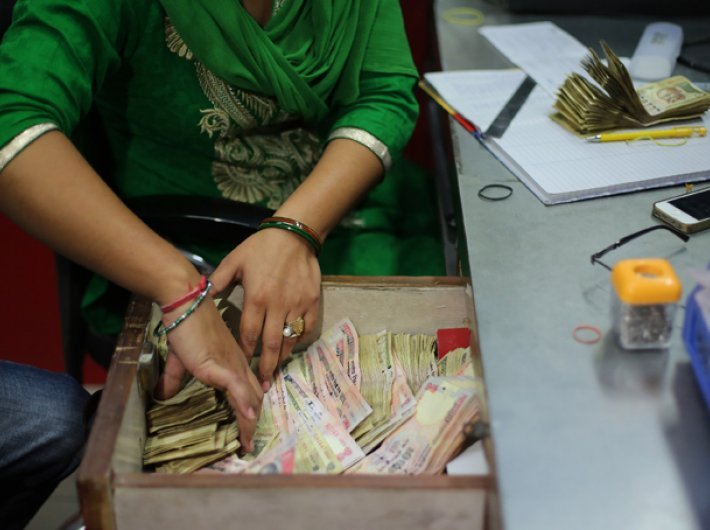Cooperative banks, which have been around for the past 100 years in one form or the other, are now facing an existential crisis.
The cooperative banks, largely controlled by politicians, are today groaning under the weight of its own contraindication – it is flush with funds following demonetisation, yet it suffers from trust deficit.
It should ideally have been an effective banking system for many who were unbanked, but things didn’t exactly work out that way. Some of the cooperative banks have turned out to be puerile initiatives.
Management issues
One of the major reasons for their poor functioning of cooperative banks has been the duality of control - with banking related functions of state cooperative banks (St CBs), district central cooperative banks (DCCBs) and urban cooperative banks (UCBs) under Reserve Bank of India (RBI)/National Bank for Agriculture and Rural Development (NABARD) - and management related functions regulated by respective state/central government.
Weak regulatory and corporate governance has led to bank failures and unsatisfactory growth of the sector.
Several boards of cooperative banks have faced action over the years.
In May 2011, then Maharashtra chief minister Prithviraj Chavan suspended the Maharashtra State Cooperative Bank for financial irregularities. As many as 55 members of board of directors including members of all political parties were sent show cause notices. The bank was controlled by members of Nationalist Congress Party at that time. Inquiries are going on.
The Madhavpura Mercantile Coop Bank in Gujarat too suffered the same fate. After licences of these banks were restored, they are now reporting profit.
Recently, the RBI barred depositors of Mumbai headquartered Kapol Cooperative Bank Ltd. (KCBL) from withdrawing over Rs 3,000 from any type of accounts. In June 2014, the RBI appointed an administrator.
Cooperative banks clearly lack the skill to survive in this cut-throat competition from established banks. Large, willful defaults are sounding their death knell.
“Most A grade banks are collapsing. What about smaller banks? Balance sheets of big banks are facing trouble as they had earlier taken over bad debts of sick banks. The cooperative banking system in country is shrinking,” says banking expert Vishwas Utagi.
A former banker who did not wish to be named said, “Post 1990, due to loopholes in the regulatory mechanisms, the co-cooperative sector too suffered and became the platform for foul play through stock market. Funds of cooperative banks were used for money laundering.”
He adds: “Most cooperative banks are controlled by local politicians from NCP and Congress. Now the ruling party under the garb of RBI/NABARD reports and restructuring and strengthening is trying to control these banks and depriving them of cash. They must bring in reforms like no political interference, proper and correct balance sheets, advances, credit and objective, not subjective loan appraisals.”
Anandrao Adsul, MP and honorary director, Mumbai Urban Cooperative Banks Federation, says, “Heads of these cooperative institutions are political leaders. In UCBs, political involvement is less and mostly the functional control is with the RBI so this removes the chance for irregularities.”
Utagi adds: “Those banks found not functioning properly were put under administrators. Their wings were clipped with by the RBI under section 35 of Banking Regulation Act, 1949.”
Demonetisation impact
The supreme court has allowed credit of demonetized notes to accounts in DCCBs only after verifying that the accounts were genuine and complied with KYC norms.
A whopping Rs 8,000 crore was received in DCCBs across the country within first four days of demonetization. Dormant accounts suddenly saw Rs 1 crore being deposited in them.
National Federation of State Cooperative Banks Ltd chairman Dileep Sanghani says that the money received in these banks was towards repayment of loans by farmers and no bank has received more than Rs 25 lakh of demonetized notes.
He adds that all DCCBs are under core banking solution (CBS), which enables customers to operate their accounts, and avail banking services from any branch of the Bank on CBS network, regardless of where he maintains his account.
“Without any provocation DCCBs were barred from accepting specified notes.”
He adds that inquiries were conducted twice on Rajkot District Coop Banks and Valsad District Coop Banks and no illegality or irregularity was found.
Banking expert Shantaram Padhye asks: “When DCCBs are regulated by NABARD, then how could they not accept Rs 500 and Rs 1,000 notes?”
“RBI has failed in its corporate governance,” says a former banker.
Sanghani adds: “I can say with authority that irregularities, if any, have been committed in urban coop banks and none in rural and agriculture coop banks across the country and it is a concerted effort of RBI to break the rural sector.”
It is not quite clear how Sanghani was giving a clean chit to all the cooperative banks in the rural sector.
Sayali Bhoir, chief executive and secretary, Maharashtra Urban Co-operative Banks' Federation, says there must be some strength in the cooperative banks which have been part of the financial system for the last 100 years without government help.
“Yet, the government banned their participation from Pradhan Mantri Garib Kalyan Yojana Scheme. Despite RBI bias and powers it is giving to nationalised and foreign banks, the DCCBs are functioning well. These foreign banks have not been able to connect to the last mile. Till the time cooperative sector is alive in rural economy, foreign banks will have a problem penetrating rural areas. It is because of cooperatives that farmers are getting loans at low rates .If this collapses, they will be charged 18%-19% on loans.”



